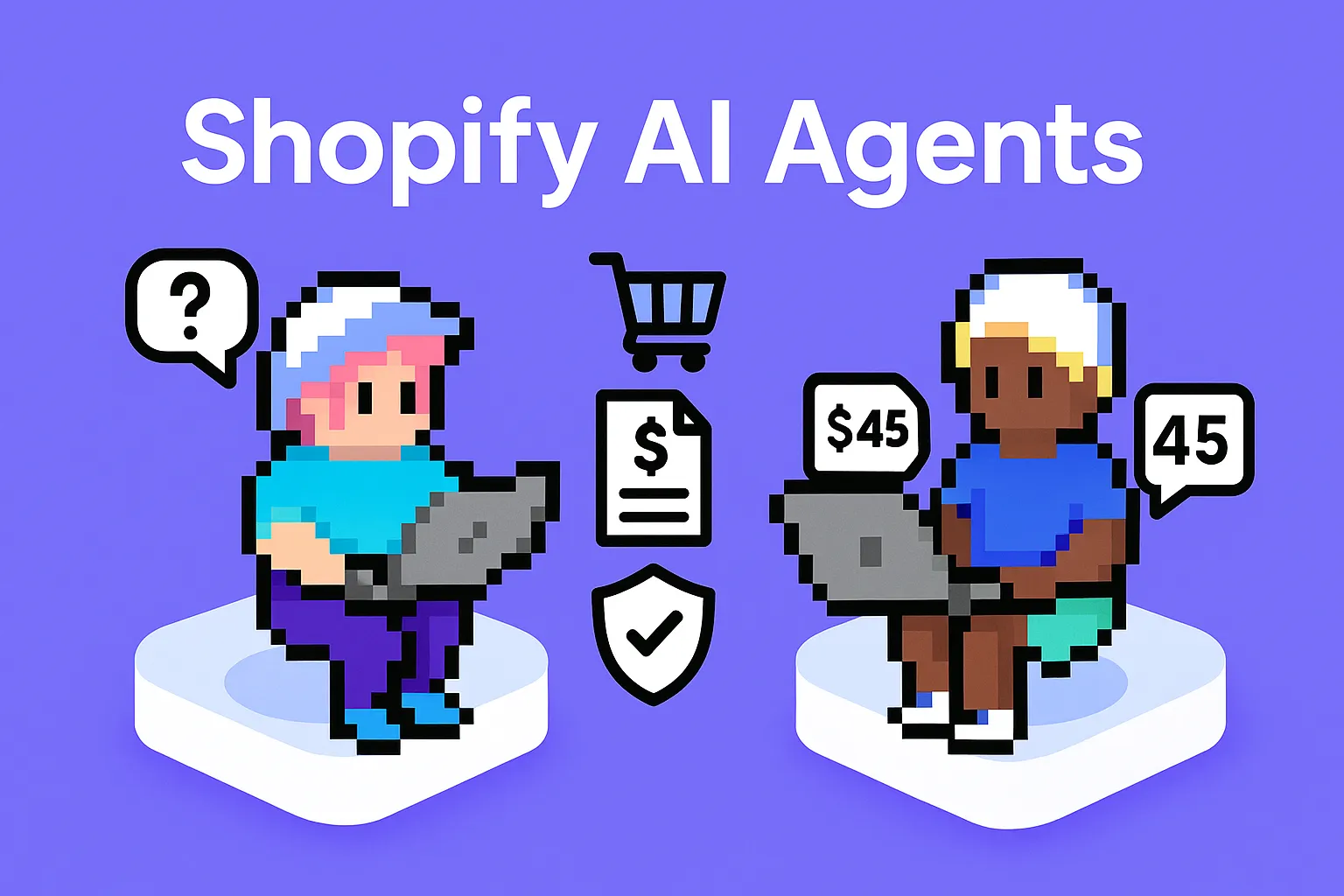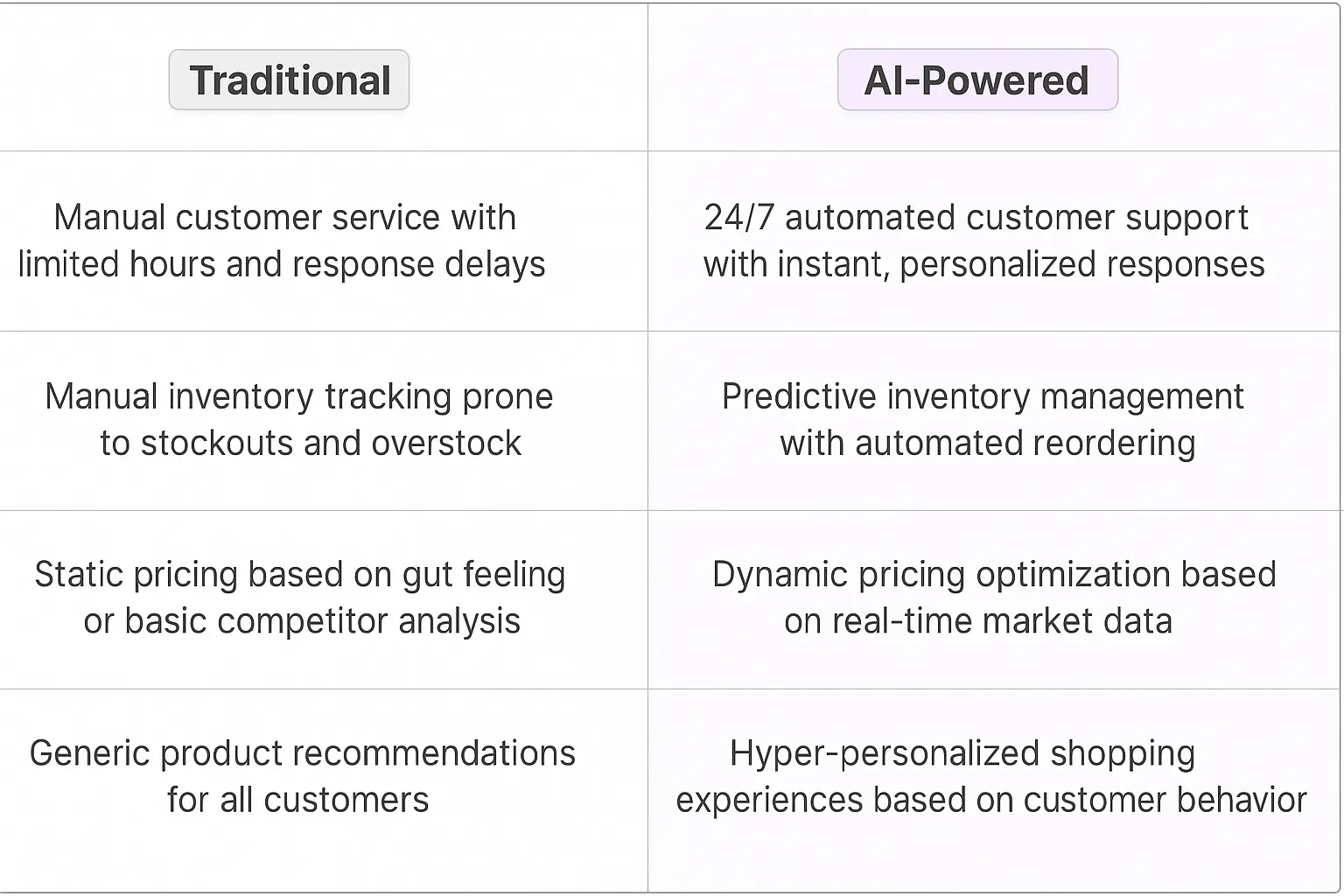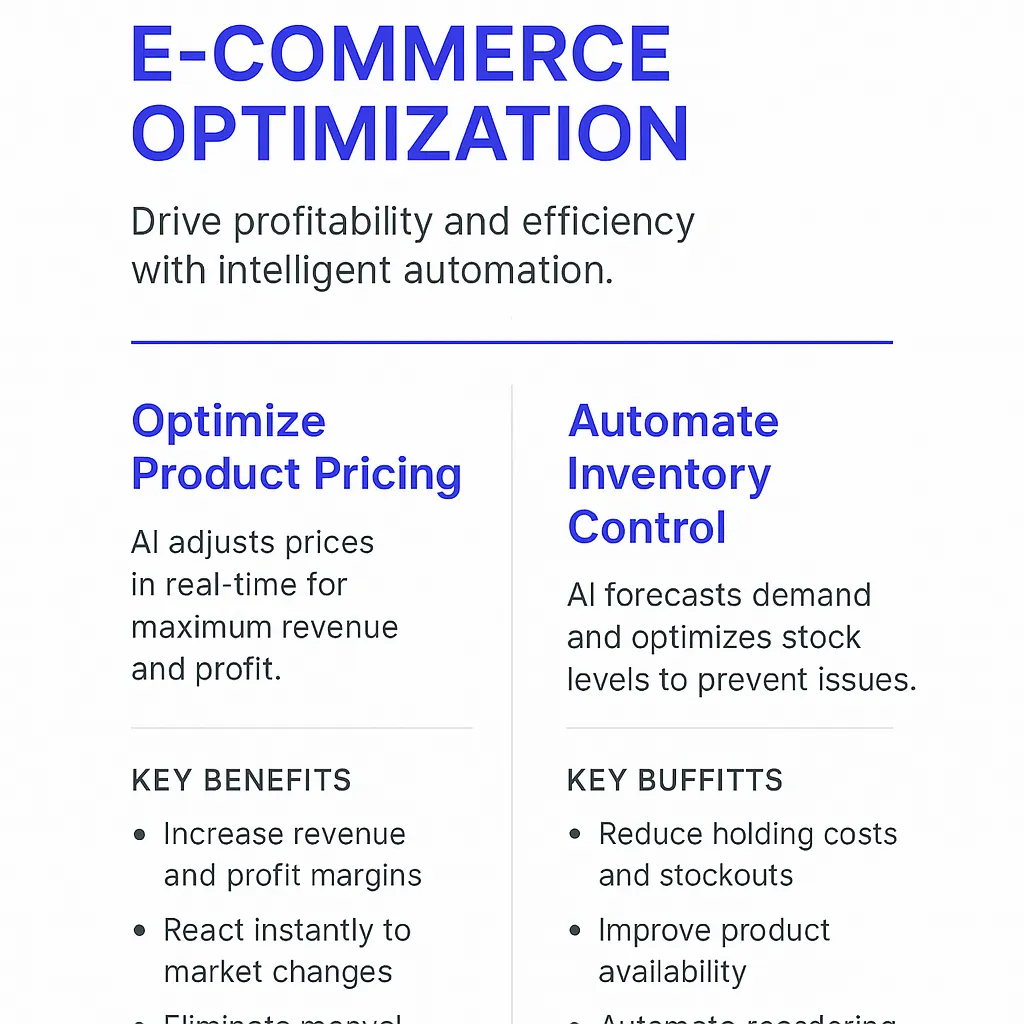Shopify AI Agents
Understanding Shopify's E-commerce Ecosystem
Shopify is a powerhouse e-commerce platform that's become the go-to for entrepreneurs looking to set up shop online. It's not just a website builder; it's a complete ecosystem that handles everything from inventory management to payment processing. What sets Shopify apart is its flexibility and scalability - whether you're selling handmade candles from your garage or running a multi-million dollar fashion brand, Shopify's got your back.
Shopify's strength lies in its comprehensive feature set. You've got customizable store themes that let you create a unique brand identity without needing a Ph.D. in web design. The platform offers robust inventory tracking, so you're never caught off guard by a sudden surge in demand. Its SEO tools help your products climb the search rankings, while built-in analytics give you the insights to make data-driven decisions. And let's not forget about the app store - it's like steroids for your e-commerce muscles, letting you add features and functionality as your business grows.

Benefits of AI Agents for Shopify
What would have been used before AI Agents?
Before AI agents entered the scene, Shopify merchants were stuck in a world of manual labor and inefficiency. They'd spend countless hours sifting through customer inquiries, updating product listings, and trying to decipher market trends. It was like trying to run a marathon with your shoelaces tied together – possible, but painfully slow and inefficient.
Merchants relied on a patchwork of tools and human effort. They'd use basic automation for simple tasks, hire virtual assistants for more complex work, and burn the midnight oil handling everything else themselves. It was a grind, and it limited their ability to scale and innovate.
What are the benefits of AI Agents?
Enter AI agents, and suddenly it's like giving Shopify merchants a team of tireless, brilliant interns who work 24/7 without complaining. These digital teammates are changing the game in ways that are both subtle and profound.
First off, AI agents are crushing it when it comes to customer service. They're handling inquiries with the finesse of a seasoned pro, but at a scale that would make even the most caffeinated customer service rep's head spin. This means happier customers, faster response times, and fewer "where's my order?" headaches for merchants.
But that's just the tip of the iceberg. These AI agents are also diving deep into data, surfacing insights that would have taken weeks of analysis to uncover manually. They're spotting trends, identifying high-potential products, and even suggesting pricing strategies that can boost margins without scaring away customers.
Perhaps most importantly, AI agents are freeing up merchants to focus on what really matters – growing their business and creating killer products. It's like having a business partner who handles all the grunt work while you focus on the big picture.
The real magic happens when these AI agents start working together, creating a symphony of efficiency across the entire Shopify ecosystem. Inventory management, marketing, logistics – it's all getting the AI treatment, and the results are nothing short of transformative.
In the end, AI agents are doing more than just making life easier for Shopify merchants. They're fundamentally changing what's possible in e-commerce, enabling a level of personalization, efficiency, and scalability that was once the stuff of science fiction. And for merchants who embrace this tech, the sky's the limit.

Potential Use Cases of AI Agents with Shopify
Processes
Shopify's e-commerce platform is ripe for AI integration, and the potential use cases are both numerous and transformative. Let's dive into how AI agents could reshape the Shopify ecosystem:
1. Dynamic Pricing Optimization: AI agents could analyze market trends, competitor pricing, and demand patterns in real-time. They'd adjust product prices automatically, maximizing profit margins while maintaining competitiveness. This isn't just about setting prices; it's about creating a responsive pricing strategy that adapts to the market's pulse.
2. Inventory Management: AI could revolutionize how Shopify merchants handle stock. By analyzing historical sales data, seasonal trends, and even social media buzz, AI agents could predict demand spikes and troughs. They'd automate reordering processes, ensuring you're never out of stock on hot items or overstocked on slow movers.
3. Customer Segmentation and Personalization: AI agents could sift through customer data, purchase history, and browsing behavior to create hyper-specific customer segments. They'd then tailor the shopping experience for each segment, from personalized product recommendations to customized email campaigns. This isn't just personalization; it's creating a unique digital storefront for every customer.
Tasks
Now, let's break down some specific tasks where AI agents could be game-changers in the Shopify ecosystem:
1. Product Description Generation: AI could analyze product features, target audience data, and top-performing listings to generate compelling, SEO-optimized product descriptions. This isn't just about saving time; it's about creating descriptions that convert.
2. Customer Service Automation: AI agents could handle routine customer inquiries, from tracking orders to processing returns. They could even detect customer sentiment in messages, escalating complex issues to human agents when necessary. This isn't just about efficiency; it's about providing 24/7 customer support that feels personal and responsive.
3. Fraud Detection: AI could analyze transaction patterns and customer behavior to flag potential fraudulent activities in real-time. This isn't just about preventing losses; it's about building trust with legitimate customers by ensuring a secure shopping environment.
4. Visual Merchandising: AI agents could analyze top-performing store layouts and product placements, then automatically adjust your store's visual elements to optimize for conversions. This isn't just about making your store look good; it's about creating a layout that guides customers towards purchase decisions.
5. Trend Forecasting: By analyzing search trends, social media data, and sales patterns across the Shopify ecosystem, AI could predict upcoming product trends. This isn't just about staying current; it's about positioning your store to capitalize on the next big thing before your competitors even see it coming.
The integration of AI agents into Shopify isn't just an upgrade; it's a fundamental shift in how e-commerce operates. It's about creating stores that are more responsive, more personalized, and ultimately more successful. As these AI capabilities evolve, we're going to see a new breed of e-commerce entrepreneurs emerge - those who can harness the power of AI to create truly intelligent online stores.

Industry Use Cases
AI agents are reshaping the Shopify ecosystem, offering game-changing capabilities across diverse sectors. These digital teammates aren't just tools; they're transformative forces that can significantly alter how businesses operate on the platform. Let's dive into some concrete, industry-specific scenarios that illustrate how AI is redefining Shopify-based operations.
From personalized shopping experiences to inventory management wizardry, AI agents are proving their worth in ways that go beyond simple automation. They're becoming integral parts of business strategy, offering insights and capabilities that were once the domain of large teams or expensive consultants. As we explore these use cases, you'll see how AI is not just supporting but actively driving growth and innovation in Shopify-powered businesses.
Retail Revolution: Shopify AI Agents in Fashion E-commerce
Let's talk about how Shopify AI agents are reshaping the fashion e-commerce landscape. These digital teammates aren't just another tech fad – they're fundamentally altering how online clothing stores operate and interact with customers.
Take a trendy boutique that's struggling to keep up with customer inquiries and inventory management. By deploying a Shopify AI agent, they're essentially cloning their best salesperson and customer service rep, then giving them superpowers.
This AI can simultaneously chat with hundreds of customers, offering personalized style advice based on past purchases, browsing history, and current trends. It's like having a fashion-savvy friend who never sleeps and knows your entire wardrobe.
But here's where it gets really interesting: these AI agents are tapping into real-time inventory data and sales patterns. They're not just suggesting items that look good – they're pushing products that are in stock and likely to sell, optimizing both customer satisfaction and the store's bottom line.
The ripple effects are significant. With AI handling routine queries and sales, human staff can focus on high-touch customer experiences and strategic decisions. This shift is allowing smaller boutiques to compete with retail giants, offering personalized service at scale.
We're seeing early adopters report 30% increases in average order value and 25% reductions in return rates. These aren't just incremental improvements – they're game-changing metrics that could redefine what it means to run a successful online fashion store.
As these AI agents continue to learn and evolve, we're on the cusp of a new era in e-commerce. The lines between online and in-store experiences are blurring, and Shopify's AI agents are at the forefront of this retail revolution.
Artisanal Food Market: Shopify AI Agents Spice Up Gourmet E-commerce
The artisanal food market is experiencing a digital renaissance, and Shopify AI agents are the secret ingredient. These digital teammates are transforming how small-batch producers and gourmet food retailers operate online, creating a feast of opportunities.
Consider a family-run olive oil business in California. They've got amazing products, but they're drowning in customer questions about flavor profiles, food pairings, and shipping logistics. Enter their new Shopify AI agent – it's like they've hired a master sommelier who's also a logistics whiz and never needs to sleep.
This AI can engage with hundreds of foodies simultaneously, offering personalized recommendations based on taste preferences, dietary restrictions, and even local cuisine trends. It's not just answering questions; it's crafting a narrative around each product, turning casual browsers into passionate buyers.
But here's where it gets really juicy: these AI agents are tapping into inventory data, seasonal trends, and even weather patterns. They're not just suggesting products that taste good – they're promoting items that are in season, in stock, and primed for purchase. This optimization is a game-changer for businesses dealing with perishable goods.
The impact is profound. With AI handling the bulk of customer interactions, human staff can focus on product development, supplier relationships, and high-touch customer experiences. This shift is allowing small producers to punch way above their weight, offering a level of personalization and expertise that even gourmet mega-stores struggle to match.
Early adopters in this space are seeing average order values increase by 40% and customer retention rates improve by 35%. These aren't just nice-to-have improvements – they're the difference between thriving and barely surviving in the cutthroat world of specialty foods.
As these AI agents continue to learn and evolve, we're witnessing the birth of a new era in gourmet e-commerce. The boundary between visiting a local farmer's market and shopping online is becoming increasingly blurred. Shopify's AI agents are the bridge, bringing the richness of artisanal food experiences to the digital realm.
Considerations and Challenges for Shopify AI Agents
Implementing AI agents for Shopify isn't just a plug-and-play solution. It's a complex endeavor that requires careful planning and execution. Let's dive into the nitty-gritty of what you'll need to consider and the hurdles you'll face.
Technical Challenges
First up, the tech stack. Shopify's ecosystem is vast, and your AI agent needs to play nice with it. We're talking about integrating with Shopify's API, handling real-time data syncing, and ensuring your agent can process natural language queries about products, orders, and customer data.
You'll need to build robust error handling and fallback mechanisms. What happens when the AI misunderstands a query? Or when Shopify's API is having a bad day? These edge cases can make or break user experience.
Data privacy is another beast. You're dealing with sensitive customer information, so your AI needs fort knox-level security. Encryption, access controls, and compliance with regulations like GDPR are non-negotiable.
Operational Challenges
On the ops side, you're looking at a whole new set of headaches. Training your AI on Shopify-specific knowledge is a massive undertaking. You need to feed it data on e-commerce best practices, Shopify's features, and common user queries. This isn't a one-and-done deal; it's an ongoing process of refinement and updates.
User adoption is another hurdle. Store owners and their staff need to trust the AI and understand its capabilities. You'll need a solid onboarding process and clear documentation. And let's not forget about managing expectations – your AI isn't going to replace human customer service overnight.
Scaling is where things get really interesting. As your AI agent gains traction, you'll need to handle increased load without compromising performance. This means investing in robust infrastructure and potentially dealing with multi-tenancy issues if you're serving multiple Shopify stores.
Lastly, there's the challenge of staying relevant. Shopify is constantly evolving, rolling out new features and updates. Your AI needs to keep pace, which means dedicating resources to continuous learning and development.
Implementing a Shopify AI agent is no walk in the park. But for those who can navigate these challenges, the potential to transform e-commerce operations is enormous. It's a high-risk, high-reward game – exactly the kind of opportunity that gets tech entrepreneurs and investors excited.
The key to success lies in understanding that user adoption isn't just about building great technology – it's about creating solutions that people actually want to use and can easily integrate into their existing workflows.
Embracing the AI-Driven Future of E-Commerce
The integration of AI agents into Shopify is more than just a tech upgrade - it's a paradigm shift in e-commerce. These digital teammates are redefining what's possible for online businesses, from hyper-personalized customer experiences to predictive inventory management. The challenges are real, but so are the rewards. As AI technology continues to evolve, we're going to see a new breed of e-commerce entrepreneurs emerge - those who can harness the power of AI to create truly intelligent online stores. The future of Shopify isn't just about selling products; it's about creating adaptive, responsive businesses that can thrive in an increasingly digital world. For those willing to embrace this AI-driven future, the opportunities are limitless.













